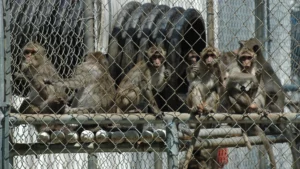 Rep. Mace says Alpha Genesis has a history of escapes and violations, and anonymous donors are putting up $250,000 to possibly rehome the 43 monkeys in a sanctuary.
Rep. Mace says Alpha Genesis has a history of escapes and violations, and anonymous donors are putting up $250,000 to possibly rehome the 43 monkeys in a sanctuary.
Last Wednesday, 43 young, female Rhesus monkeys bred for scientific and medical research escaped from the Alpha Genesis Primate Research Center in Yemassee, prompting international media coverage, Internet memes, and animal rights outrage, and now a United States Congresswoman is getting involved and demanding a full investigation.
As of 6 p.m. on Tuesday, 32 escaped monkeys have been safely recovered, announced the Yemassee Police Department, leaving 11 at large. The remaining primates continue to be sighted close to the traps and in the woods adjacent to the facility. They have been heard cooing back and forth to each other, and efforts to safely capture them continue, say officials.
 The same day, Nov. 12, Congresswoman Nancy Mace, the U.S. Representative for South Carolina’s 1st District, contacted the U.S. Department of Agriculture (USDA) and the National Institutes of Health (NIH) demanding an inquiry and briefing, calling the recent escape “the latest in a long list of violations from this USDA and NIH-funded laboratory.”
The same day, Nov. 12, Congresswoman Nancy Mace, the U.S. Representative for South Carolina’s 1st District, contacted the U.S. Department of Agriculture (USDA) and the National Institutes of Health (NIH) demanding an inquiry and briefing, calling the recent escape “the latest in a long list of violations from this USDA and NIH-funded laboratory.”
“For years, Alpha Genesis has racked up federal contracts and taxpayer dollars while consistently violating animal welfare laws and exposing the public to dangerous escapes,” said Rep. Nancy Mace in a three-page letter. “NIH and USDA need to step up and ensure South Carolinians don’t bear the risk of this lab’s negligence.”
In a media statement, Mace’s office added:
“Despite receiving over $110 million in taxpayer funding since 2008 — including $19 million this year alone — Alpha Genesis has a disturbing history of animal welfare violations and public safety risks. Housing over 10,000 primates, including 3,300 on NIH’s controversial Monkey Island, the lab has faced frequent federal citations for unsafe enclosures, poor veterinary care, and preventable animal deaths. Yet oversight remains minimal, with recent inspections confirming multiple violations, including escaped primates and fatal neglect.”
“In light of these recent incidents and the facility’s ongoing history of violations, our office has demanded a full briefing from the NIH and USDA, including:
- A complete breakdown of active contracts and inspections with Alpha Genesis
- Documentation of communication with Alpha Genesis regarding the recent monkey escape
- Immediate corrective actions to enhance oversight and safety at Alpha Genesis
The Hampton County Guardian/USA Today Network – South Carolina has made numerous unsuccessful attempts to contact Alpha Genesis for comment on the alleged violations and recent involvement of Rep Mace.
In a 2011 interview with The Hampton County Guardian, Alpha Genesis CEO Greg Westergaard said that his facilities are primarily for breeding, with limited research done on site, and added that primate research is “often mankind’s greatest tool in developing cures for countless diseases” helping to further vaccine development and cures for a wide range of diseases: cancer, heart disease, diabetes, Multiple Sclerosis, Muscular Dystrophy, and more.
“I fully support alternatives to using animals for research…” Westergaard told The Guardian in 2011, “But I don’t see any way around it at this time. But I also support medical advancements that can help large numbers of people. Our goal is to keep the animals as healthy as possible, and use as few as possible.”
What does Congresswoman Mace’s letter state?
In her letter to the USDA and NIH officials, Rep. Mace states that the recent primate escape puts both the animals and her constituents at risk, makes several allegations against Alpha Genesis’ quality of care, and demands better federal oversight of taxpayer dollars that go to these primate research centers.
- Mace stated that, according to federal records, as of May 2024 Alpha Genesis houses 6,701 primates at its sites in Yemassee (one in Beaufort County and one in Hampton County), as well as 3,300 at its “Monkey Island,” more properly known as Morgan Island, which is located in her district off the coast of Beaufort County.
- Mace alleged that in 2023 alone Alpha Genesis used 449 primates in research, including “painful experimentation,” and produces 500 animals per year for government use, where they are shipped to taxpayer-funded labs.
- Since 2008, Alpha Genesis received over $110 million in taxpayer funding through contracts or subcontracts with the USDA, the U.S. Food and Drug Administration, the Department of Defense, the Department of Health and Human Services, and even the Small Business Administration.
- This year alone, Alpha Genesis received $19 million from the NIH to breed, confine, and experiment on primates at its sites in South Carolina.
Mace contends that Alpha Genesis has a history of violating federal laws and policies and questions the effectiveness of the USDA’s and NIH’s oversight and use of tens of millions of taxpayer dollars.
“We ask you immediately brief our office on the status of all active contracts your agencies have with Alpha Genesis, the results of inspections conducted by your agencies of Alpha Genesis facilities, your communication with Alpha Genesis pertaining to the recent escape of 43 primates, and your plan for corrective action and increased federal oversight over Alpha Genesis,” Mace writes.
Alpha Genesis research and breeding centers have a history of primate escapes, animal welfare violations
Mace alleges that Alpha Genesis primates are “subjected to painful and deadly experiments involving dangerous pathogens and invasive procedures.”
Referencing records obtained by her office, Mace references several specific incidents and violations at Alpha Genesis:
- Alpha Genesis has a “long history of monkey escapes,” including six separate, documented incidents of animals opening or escaping their enclosures between January and August of 2022. During these escapes, one animal died from trauma caused by other resident monkeys, while several others required vet care.
- In 2014, more than two dozen monkeys escaped, causing the USDA to cite and fine Alpha Genesis.
- In May 2016, the USDA’s Animal and Plant Health Inspection Service opened an investigation into Alpha Genesis as part of part of a larger probe into the mistreatment of non-human primates.
- In 2018, Alpha Genesis was fined for six more violations, including another escape.
- One infant monkey died after being entangled in material used to secure its water bottle, and in two unrelated incidents in July 2022 two animals got their fingers entrapped in structures inside their enclosures and were later found dead.
- Under Alpha Genesis care, monkeys have frozen to death, died of dehydration, or been killed by other distressed primates.
- In September 2022, federal inspectors cited Alpha Genesis for “critical” violations of the Animal Welfare Act related to inadequate oversight, substandard housing, and primate escapes resulting in injuries or death.
- In January 2023, federal inspectors cited Alpha Genesis for violations of the Animal Welfare Act due to dangerous and dirty primate enclosures.
In Rep. Mace’s letter, she cites several government documents, web pages, and news reports. The Hampton County Guardian has obtained many of these governmental records, and is still investigating.
Animal rights groups respond to escape, Mace’s inquiry
Over the past week, while the monkeys have remained at large amid a frenzy of media coverage, officials from animal rights groups such as People for the Ethical Treatment of Animals (PETA), the White Coast Waste Project, and Born Free USA have issued multiple statements to The Hampton County Guardian.
Statement from Justin Goodman, Senior Vice President, White Coat Waste Project
“Escaping is the only shot these monkeys have of avoiding taxpayer-funded torture. We’ve documented how 10,000 primates are imprisoned on the Alpha Genesis-run monkey island and in its other labs and most are destined for cruel government experiments that involve having their skulls drilled into, electrodes implanted in their brains, being infected with deadly viruses like Ebola, infested with ticks, and being forcibly addicted to cocaine and fentanyl. This notorious primate abuser has raked in over $19 million in 2024 and over $110 million since 2008 from government agencies including the NIH, FDA, CDC, and the Department of Defense. Taxpayers shouldn’t be forced to pay. We’re proud of our years of bipartisan work with Rep. Mace to stop this madness by passing legislation to defund painful primate testing and retire monkeys to sanctuaries.”
Statement from PETA primate scientist Dr. Lisa Jones-Engel:
PETA spokespersons stated that the Born Free USA Primate Sanctuary in Texas has contacted Alpha Genesis, offering to work with it to provide the animals with a “suitable home,” and PETA says it has contacted the NIH requesting that, once all are recovered, the 43 animals be released to their care.
“It’s their hope that the U.S. National Institutes of Health (NIH), which owns the animals, will recognize that these monkeys, who bravely claimed their freedom, should not be subjected to a lifetime of misery in laboratories… We hope this generous offer will spur NIH to do the right thing and let these monkeys have decent lives,” says PETA primate scientist Dr. Lisa Jones-Engel. “They deserve to live the way there were intended to—enjoying time with their extended families and not confined to a metal box.”
Statement from Angela Grimes, CEO of Born Free USA:
On Monday, Born Free USA announced that concerned, anonymous donors are donating $250,000 to PETA and to the sanctuary to provide long-term care of any of the escaped monkeys that the sanctuary receives.
On Tuesday, Born Free USA, which is a home to more than 200 monkeys rescued from labs, zoos, and the pet trade, called for these animals to be relocated to its GFAS accredited primate sanctuary in Texas, “where we can provide them with a safe, natural environment and a life free from the threats and restrictions they currently face in captivity.”
“We are deeply concerned for the welfare of the 43 monkeys who have reportedly escaped from the Alpha Genesis facility in South Carolina. The monkeys are vulnerable, with no experience of living outside of their captive environment. As wild animals, they also pose a risk to humans, with a particular threat of zoonotic disease spread. We are reaching out to Alpha Genesis today to invite them to work with us to rehome the monkeys to sanctuary, where they can live out their days in safety. We await their response and encourage them to make the right decision to allow these monkeys a second chance at life, away from harm. We invite those who share our concerns to reach out to Alpha Genesis to ask them to support our urgent proposal.”
The Hampton County Guardian/USA Today Network – South Carolina will continue to provide updates on this ongoing situation in the S.C. Lowcountry.

